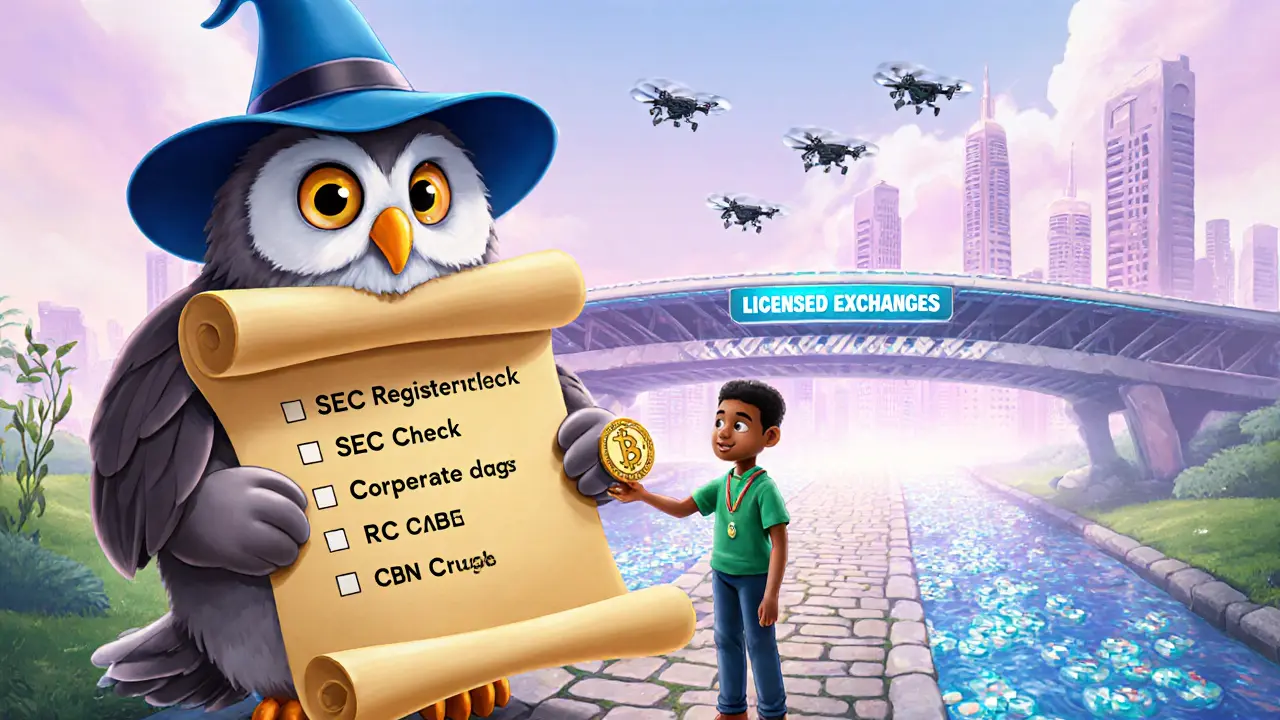Crypto Exchange Compliance Checker
Check Exchange Compliance
Enter the name of a crypto exchange to verify if it is licensed by the Securities and Exchange Commission (SEC) of Nigeria in 2025.
- Check the official SEC registry for a license number in format: SEC/CRP/2025/###
- Confirm local incorporation using the Corporate Affairs Commission (CAC) portal
- Look for the CBN Verified badge on the exchange's Nigerian landing page
Since the Investments and Securities Act of 2025 (ISA2025) turned crypto into a regulated asset class, Nigerian users are suddenly faced with a stark choice: stick with the few fully licensed platforms or risk everything on offshore services that operate without approval. The stakes are high - bank accounts get frozen, funds vanish, and there’s no safety net if a platform disappears. This guide pinpoints the exchanges you should steer clear of, explains why they’re risky, and shows you how to confirm a platform’s compliance before you trade.
Key Takeaways
- Only Quidax and Busha hold full SEC licenses in Nigeria as of March2025.
- Using unlicensed exchanges such as Bybit, KuCoin or Binance P2P has led to over ₦548million in frozen accounts since 2024.
- SEC‑licensed platforms provide insurance up to ₦50million per user and integrate directly with Nigerian banks.
- Verify licensing by checking the official SEC registry (sec.gov.ng/crypto‑exchanges) and looking for the “SEC/CRP/2025/###” number.
- Switching to a licensed exchange cuts your risk of asset seizure by more than 80% according to community surveys.
crypto exchanges Nigeria currently operate under a clear regulatory divide - licensed versus unlicensed - and the line is drawn by the Securities and Exchange Commission (SEC) under ISA2025.
What the 2025 Regulatory Framework Looks Like
The Investments and Securities Act of 2025 reshaped the market in three concrete ways:
- Mandatory licensing. Every virtual asset service provider must obtain a license from the Securities and Exchange Commission. The SEC now treats crypto tokens as securities.
- Strict AML/CFT standards. Platforms need biometric KYC, transaction‑monitoring engines capable of handling 10,000+ TPS with 99.99% uptime, and real‑time reporting to the Nigerian Financial Intelligence Unit.
- Capital and audit requirements. Minimum operational capital of ₦500million and quarterly audits by SEC‑approved firms are non‑negotiable.
Failure to meet any of these criteria triggers enforcement actions ranging from asset freezes to full seizure under Section134 of ISA2025.
Licensed Exchanges - The Safe Choices
Only two platforms have cleared the SEC’s vetting process:
- Quidax - operates as Quidax Technologies Limited (RC1782456) and offers Naira deposits as low as ₦1.
- Busha - registered as Busha Fintech Limited (RC1834562) with similar low‑minimums.
Both provide:
- SEC‑mandated insurance up to ₦50million per user.
- Real‑time transaction monitoring that flags suspicious activity within 500ms.
- Dual verification for every crypto‑to‑fiat conversion, as required by the Central Bank of Nigeria (CBN).

Unlicensed Exchanges - Why They’re Dangerous
Platforms operating without SEC approval include:
- Bybit
- KuCoin
- Binance P2P
These services often run through offshore entities in Seychelles or Malta, lack Nigerian legal registration, and cannot integrate with local banks. The result? Users are forced into peer‑to‑peer (P2P) trades that comprised 92% of the country’s crypto volume in 2024 (Chainalysis).
Key risks documented in 2024-2025:
- Account freezing - the Economic and Financial Crimes Commission (EFCC) froze 22 accounts worth ₦548.6million linked to Bybit and KuCoin.
- No consumer protection - unlicensed platforms have no SEC‑mandated insurance, leaving users exposed to total loss.
- Higher fees on hidden services - while advertised fees look lower (0.15% vs 0.25% on licensed platforms), the indirect cost of frozen assets outweighs any savings.
- Lengthy dispute resolution - average 28days with the SEC vs 3.2days on licensed platforms (Nigerian Cybercrime Unit, Q22025).
Real‑World Stories: What Happens When You Use an Unlicensed Platform
Reddit user u/LagosTrader89 lost access to ₦2.4million after the EFCC froze his account for trading on KuCoin. It took 47days and 12 visits to EFCC offices to recover only 63% of the funds. A Trustpilot analysis of 1,247 Nigerian reviews (Jan‑Aug2024) gave unlicensed exchanges an average rating of 2.1/5, with 89% of negative feedback citing “account freezing” or “regulatory issues.”
The Blockchain Association of Nigeria’s September2024 survey found 67% of users of unlicensed exchanges experienced at least one freeze, versus just 3% for licensed platforms. On Nairaland, a thread titled “My ₦5m frozen by EFCC for Bybit trading” attracted over 1,200 replies, many reporting never‑fully‑recovered funds.
How to Verify Whether an Exchange Is Licensed
Follow these three steps before depositing any Naira:
- Check the SEC registry. Visit sec.gov.ng/crypto-exchanges. Licensed platforms display a unique license number like
SEC/CRP/2025/001. - Confirm local incorporation. Use the Corporate Affairs Commission (CAC) portal to verify the company’s RC number (e.g., Quidax’s RC1782456).
- Look for the CBN Verified badge. Licensed exchanges must show a “CBN Verified” badge on their Nigerian landing page, which can be validated via SMS: send
VERIFY [exchange name]to 20255.
If any of these checks fail, walk away.

Side‑by‑Side Comparison: Licensed vs. Unlicensed Exchanges
| Feature | Licensed (Quidax, Busha) | Unlicensed (Bybit, KuCoin, Binance P2P) |
|---|---|---|
| SEC License | Yes - SEC/CRP/2025/001 & 002 | No |
| Nigerian Legal Entity | Registered (RC1782456, RC1834562) | Offshore shell (Seychelles/Malta) |
| Bank Integration | Direct Naira deposits, CBN Verified badge | None - P2P only |
| Insurance Coverage | Up to ₦50million per user | None |
| AML/KYC Standards | Biometric NIN, 99.99% uptime monitoring | Basic email/KYC, no biometric link |
| Average Fee | 0.25% | 0.15% (but hidden freeze costs) |
| Account Freeze Risk (2024‑2025 data) | ~3% | ~67% |
Practical Steps to Protect Your Crypto Assets
- Move funds to a licensed platform. If you currently hold assets on Bybit, KuCoin or Binance P2P, withdraw them to a local bank and deposit via Quidax or Busha within 48hours.
- Enable two‑factor authentication (2FA). All licensed exchanges support Google Authenticator; treat this as a non‑negotiable security layer.
- Keep records of all withdrawals. Screenshot the transaction ID, the SEC license number displayed, and the CBN verification SMS confirmation.
- Stay updated. The SEC registry is refreshed weekly - set a reminder to check for new licensed entrants every month.
- Consider diversification. While licensed exchanges are safest, you may allocate a small fraction (≤5%) to decentralized exchanges (e.g., Uniswap) only if you understand the added risk and have a secure wallet.
What to Expect from Future Enforcement
Starting September2025, the SEC will roll out automated monitoring that can freeze assets from unlicensed platforms within 15minutes. The EFCC has expanded its crypto‑fraud unit to 47 investigators, aiming for a total shutdown of illegal exchanges by Q42025. Analysts predict that by early2026, 98% of Nigerian crypto users will be on licensed platforms. The only remaining gap will be the growing use of decentralized exchanges, which lack any regulatory oversight.
Frequently Asked Questions
How can I tell if an exchange is SEC‑licensed?
Visit the official SEC registry (sec.gov.ng/crypto‑exchanges) and look for a license number that follows the format SEC/CRP/2025/###. Licensed platforms also display a “CBN Verified” badge and their Nigerian RC number.
What happens if I keep using an unlicensed exchange?
You risk account freezing, loss of funds, and no legal recourse. The EFCC has already frozen accounts worth over ₦500million linked to unlicensed platforms.
Are fees really lower on unlicensed platforms?
Unlicensed sites advertise fees around 0.15%, but the hidden cost of potential asset seizure far exceeds any savings. Licensed exchanges charge about 0.25% but include insurance and fast dispute resolution.
Can I use a decentralized exchange safely?
DEXs like Uniswap have no regulatory safeguards, so they’re riskier than any licensed platform. Use them only for a small portion of your portfolio and keep the private keys securely stored.
What documentation should I keep after transferring to a licensed exchange?
Save screenshots of the SEC license number, the CBN verification SMS, transaction IDs, and any email confirmations. These records help if you ever need to dispute a charge or prove compliance.


Marcus Henderson
Transitioning to SEC‑licensed platforms such as Quidax or Busha safeguards your investments and aligns with the new regulatory framework. The insurance coverage up to ₦50 million per user provides an additional safety net. Direct bank integration simplifies the deposit process, allowing quick Naira transfers.
Liam Wells
While the guidance appears comprehensive, one must observe that regulatory compliance alone does not guarantee absolute security; numerous offshore entities continue to operate under the radar, exploiting loopholes, and users should remain vigilant; the sheer volume of P2P trades indicates a persistent demand for unlicensed services, which may undermine the intended protections.
Darren Belisle
Indeed, the risk mitigation offered by licensed exchanges is significant!!! However, newcomers often feel overwhelmed by the formalities; a step‑by‑step guide can make the transition smoother; remember that every insured user enjoys a stronger position against potential freezes.
Heather Zappella
For anyone uncertain about how to verify a platform’s legitimacy, start by visiting the official SEC registry at sec.gov.ng/crypto-exchanges. Look for a license number formatted as SEC/CRP/2025/###. Next, cross‑check the company’s RC number on the Corporate Affairs Commission portal; this confirms Nigerian incorporation. Finally, ensure the website displays the “CBN Verified” badge and, if possible, send a verification SMS (VERIFY [exchange] to 20255). Keep screenshots of each step for future reference. Following these three steps minimizes exposure to unlicensed operators and protects your assets.
Jason Wuchenich
Great advice! By documenting each verification step, you create a clear audit trail. That way, if any dispute arises, you have concrete evidence to present to the SEC or your bank.
Kate O'Brien
Also, stay away from exchanges that don’t show the badge. They often hide behind offshore shells and can disappear with your funds.
Ricky Xibey
Never trust an exchange without a Nigerian license.
Sal Sam
From a compliance standpoint, the absence of a SEC‑issued license indicates non‑adherence to AML/CFT protocols, which raises red flags for both regulators and financial institutions.
Moses Yeo
But consider that regulatory frameworks can be gamed; some offshore platforms simply adopt superficial compliance measures while retaining the same level of risk for users.
Lara Decker
Honestly, most people just want low fees and fast trades, so they ignore the warnings and end up losing big time.
Anna Engel
Oh sure, because paying a few extra basis points for insurance is such a tragedy-who needs protection when you can gamble with your savings?
manika nathaemploy
i get that some ppl dont want the extra steps, but its better safe then sorry lol.
Debra Sears
Exactly, taking a few extra minutes now can save you from headaches later. If you have any doubts, feel free to ask – I’m happy to help you navigate the process.
Andrew Lin
Enough with the foreign platforms! Nigerian assets should stay in Nigerian hands, especially after the new regulations – any outsider is a risk.
Matthew Laird
While patriotism is commendable, abandoning proven security measures for ideological reasons can expose users to unnecessary danger and financial loss.
Caitlin Eliason
💡 Staying on licensed platforms not only protects your funds but also supports the growth of a regulated crypto ecosystem in Nigeria. 🌍
Ken Pritchard
Let’s keep the discussion welcoming and focused on practical steps. Sharing personal experiences with licensed exchanges can be valuable for newcomers.
Brian Lisk
When evaluating whether to move your crypto holdings, it is essential to consider several interrelated factors that collectively determine the overall safety and utility of a given platform. First, regulatory compliance should be verified through the official SEC registry, as this provides the foundational legal assurance that the exchange operates under the oversight of the Nigerian Securities and Exchange Commission. Second, the presence of a tangible insurance policy, such as the ₦50 million per‑user coverage offered by Quidax and Busha, serves as a financial buffer against potential losses caused by operational failures or external threats. Third, direct bank integration is a practical feature that streamlines fiat‑on‑ramp and off‑ramp processes, reducing reliance on third‑party P2P networks that can be more vulnerable to fraud. Fourth, robust AML/KYC procedures, including biometric NIN verification and real‑time transaction monitoring with 99.99% uptime, are critical for preventing illicit activity and maintaining the exchange’s good standing with regulatory bodies. Fifth, the platform’s technological infrastructure, such as low latency order matching engines and secure cold storage solutions, directly impacts both the speed of trades and the protection of assets. Sixth, community reputation, as reflected in user reviews on forums like Nairaland or Reddit, can provide insight into real‑world experiences with account freezes or customer support responsiveness. Seventh, the cost structure, including transparent fee schedules without hidden charges, ensures that users are not unknowingly paying excessive rates that could erode profits over time. Finally, ongoing compliance updates should be monitored, because regulatory requirements may evolve, and platforms that proactively adapt demonstrate a commitment to user security. By systematically reviewing each of these criteria, investors can make an informed decision that balances risk mitigation with operational convenience, ultimately fostering a more secure and vibrant crypto ecosystem in Nigeria.
Richard Bocchinfuso
i think the tips are good but sometimes ppl just want fast cash and dont read all that stuff lol
Melanie LeBlanc
True, simplicity matters, but a quick reminder: even a brief glance at the SEC registry can spare you from bigger headaches later. A splash of color in your financial life comes from confidence, not chaos.
Don Price
It’s easy to shrug off regulatory advice, thinking the odds are low that you’ll be personally affected. Yet, the data tells a different story: over half a million Naira have already been frozen across unlicensed platforms, a figure that continues to rise as more users chase lower fees. This isn’t a random fluke; the pattern emerges from systematic enforcement actions that target offshore entities lacking proper oversight. By ignoring these signals, you essentially gamble with your hard‑earned money, hoping that the next crackdown doesn’t involve you. Moreover, the psychological toll of dealing with frozen assets-stress, sleepless nights, and a loss of trust in the broader crypto ecosystem-often outweighs any marginal savings from cheaper fees. The prudent approach is to embrace the certified exchanges, which not only comply with SEC mandates but also provide insurance, streamlined banking integration, and a clear avenue for recourse if something goes wrong. In the long run, the incremental cost of using licensed services pays dividends in peace of mind and financial stability.
Jasmine Kate
Honestly, I’m tired of the same old warnings. People keep jumping on shady platforms because they think they’re smarter than the system, and then they cry when their cash disappears. It’s classic drama.
Mark Fewster
It is worth noting, however, that the frequency of account freezes on unlicensed exchanges has been statistically significant; this suggests a systemic risk rather than isolated incidents; users should therefore prioritize platforms with verifiable compliance.
Dawn van der Helm
Stay positive, stay safe, and keep those crypto dreams alive! 🚀💡